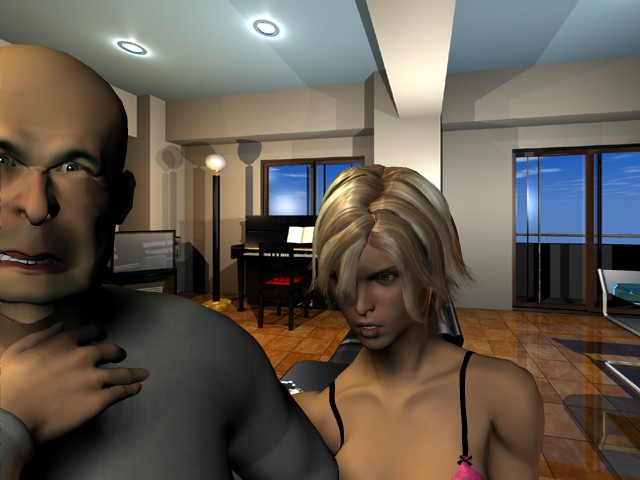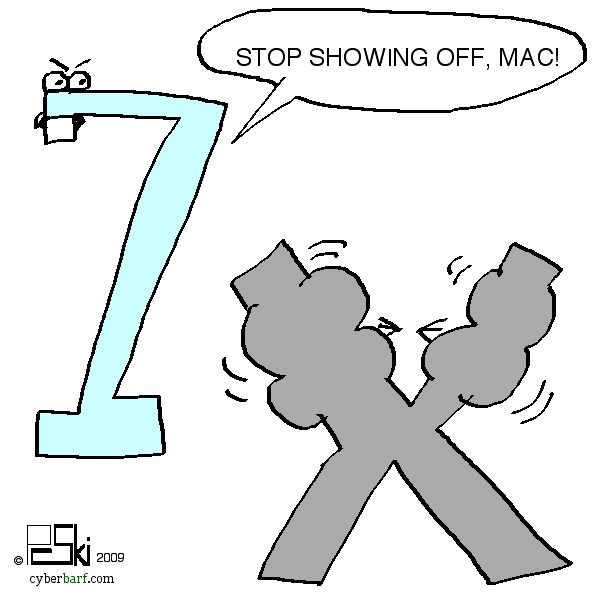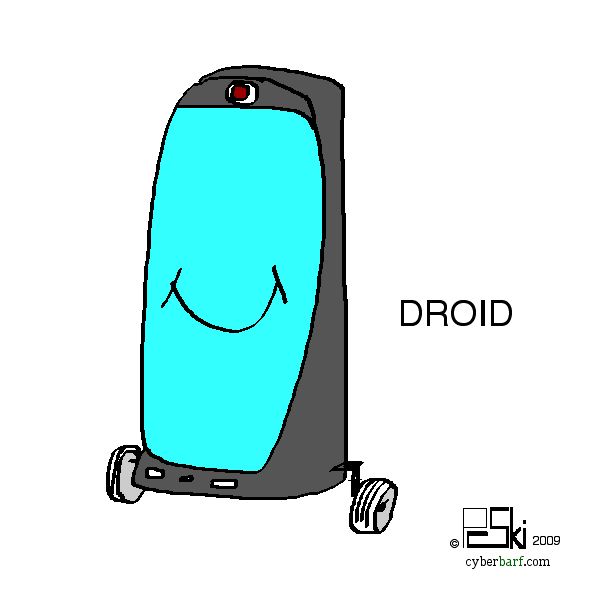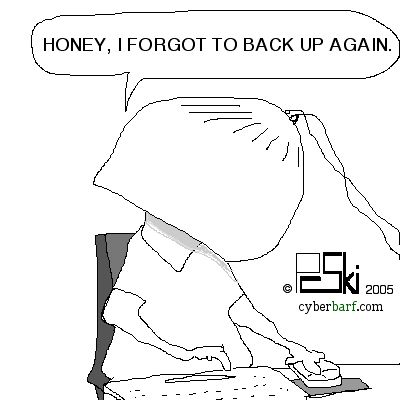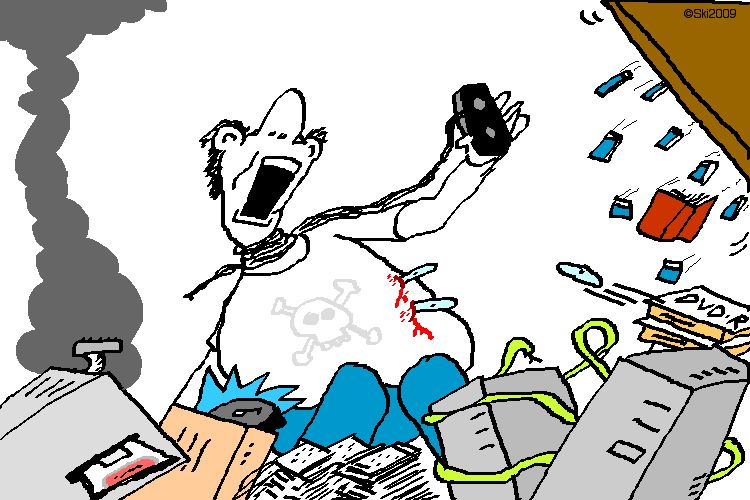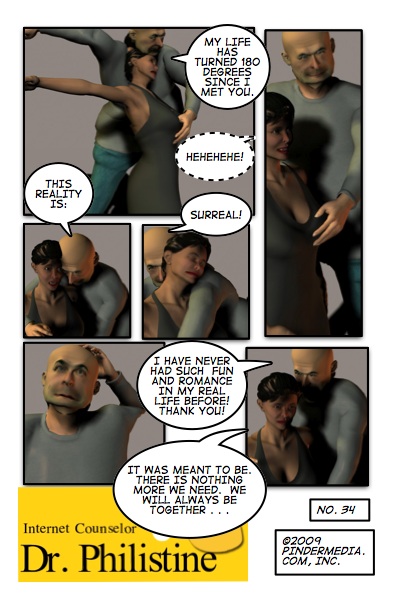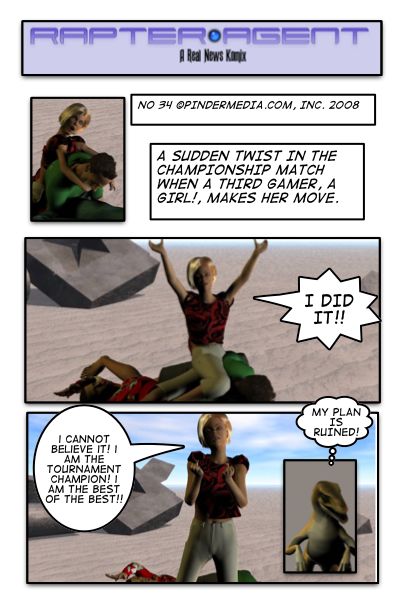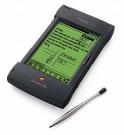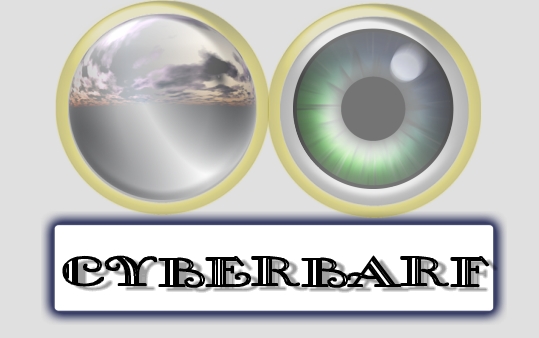|
THE CLIMAX OF DR. PHILISTINE, INTERNET COUNSELOR IS UPON US!!! WHAT WILL HAPPEN TO HIM??? WHAT WILL HAPPEN TO THEM???! |
cyberbarf9.4 EXAMINE THE NET WAY OF LIFE NOVEMBER, 2009 IN THIS ISSUE: Y2K PHONE HOME WHETHER REPORT iTOONS BEEP BEEP BACK UP REAL NEWS KOMIX FRIG' NEWTON? |
 |
 |
 |
|
cyberbarf Y2K ARTICLE Ten years ago, in a land not that far away, a geeky empire of stealth forces took over the world's information systems under the guise of an apocalyptic crash of all of humankind's computers, the Dark Star of system administrators - - - nightmares: Y2K. The boys who cried Wolf screamed loudly to a panic soaked corporate class that all old computer systems (which still controlled the basic infrastructure in the civilized world) that when the calendar rolled over to 2000, all systems would read the new date as zero-zero or in computer code, End of Program. The new date would trigger a cascade of computer errors that would knock out all automation: power grids, generators, banking systems, information servers, everything! The Y2K bug would be a technological computer nuke that would take everyone back into the dark stone ages. Billions of dollars were spent retro-writing old computer programs of critical systems to make sure computers would not shut down when the date changed to 1-1-00. Since many programs were ancient by current standards, thirty years out of date, retired programmers with knowledge of old source coding, were in high demand. The need to correct the date sensitive programs to avoid the pending doom was a lottery for consultants who had more clients than manpower to cover the demand. Some businesses decided to upgrade their systems, from the main frames in the back office, to every single desk top cubical. Better safe than saying sorry to an angry board of directors, whose competitors made the required changes while you did not. Peer pressure was too great not to fall into the hysteria of Y2K. Corporations also formed committees of department heads to go over catastrophe planning of power failures, information failures, transportation failures and security breaches. New protocols and manuals were prepared and employees were trained in corporate survival if any disaster would befall the company. Individuals were also caught up in the Y2K mania. Many went into survivalist mode: bunker mentality. It came down to over-focus on the basics: food, shelter and security. They went out and bought camping gear, army surplus dehydrated food packs, canned goods, cases of water, loads of wood for fireplaces and batteries for flashlights. There was a run on gasoline fueled home generators. Home security against the potential of mobs roaming suburbia included new locks, dead bolts, and bullets. Even the most conservative reactions to the new Year was to go to the bank and pull out more cash than usual. Banks reported record amounts of cash withdraws in the last weeks of December, 1999. On a normal New Year's Eve, drunken party goers would count down the seconds to midnight. But many people stayed at home, hunkered down with their family, dreading the count down from ten. At 12:01 a.m., nothing happened. The power stayed on. The street lights did not go dark. Broadcasting signals were still heard. All that could be heard was the collective sigh of relief. The proponents of the Y2K fix patted themselves on the back for doing all the heavy lifting to avoid a global crisis. All the expensive preparation paid off with the Y2K bug being exterminated before midnight. The Y2K experts celebrated their victory. Except, in the underdeveloped world, who did not have the resources to make the required Y2K fixes that the western industrialized states spent billions of dollars, nothing happened. The third world's old computer system, which contained the Y2K bug, did not crash and burn. No power failure, no cut off of systems, no loss of information. Nothing. The Wall Street Journal commented afterward that “Y2K was the greatest hoax of the century.” Y2K was the ultimate bogey man for the general public who did not comprehend the complexity of computers. For those who preached with absolute certainty that The End was Near, they found gullible believers who craved a fix. The absolute truth was selling panic over real substance.
|
|
THE CUB SEASON IS OFFICIALLY OVER, BUT IT NEVER TOO LATE FOR TRUE FANS TO SHOW THEIR TRUE FEELINGS. ROCK BOTTOM TEE-SHIRT IS HERE AT THE PINDERMEDIA.COM STORE!
ON SALE NOW! PERFECT HOLIDAY GIFT FOR THE SUFFERING CUB FAN.
|
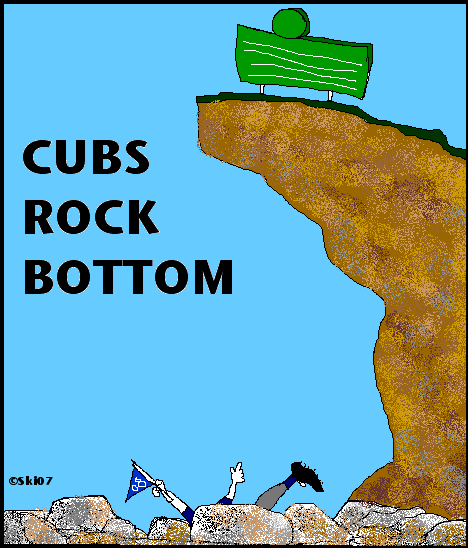 |
|
cyberbarf PHONE HOME CYBERCULTURE
Next was brick phone, slightly more portable, like a walkie talkie on steroids. It felt like lifting a free weight bar bell. Again, the concept was popular but the public phone was still more convenient and cheaper for the average person. The breakthrough came in the development of cell tower technology. By being able to triangulate signals over the air and bypass breaks in the old land line system, people could actually use a portable telephone device while on the move. Transistor and microprocessor technology made the guts of the modern cellphone affordable and pocket size. Each generation of cellphone turns into thinner smart phone with more and more features which makes the device's primary purpose, public phone calls, secondary. Bluetooth ear pieces will probably give way in the future to ear bud size communication devices like the Star Trek comm pin. Today, it is difficult to find an actual working pay phone on a public street or in a public building such as a hotel or theater. The mass consumption of cell phones by the general public has made the stationary public telephone a nearly extinct form of communications. |
 |
 |
|
cyberbarf THE WHETHER REPORT |
cyberbarf STATUS |
| Question: Whether the call that all Congressional bills be posted on-line at least 72 hours before Congress votes will fall upon deaf ears by the House and Senate leadership? |
* Educated Guess * Possible * Probable * Beyond a Reasonable Doubt * Doubtful * Vapor Dream |
| Question: Whether e-readers like the Kindle create a new, sustainable and profitable market for old media newspaper publications? |
* Educated Guess * Possible * Probable * Beyond a Reasonable Doubt * Doubtful * Vapor Dream |
| Question: Whether social network sites will continue to dominate (increase total share) of the web bandwidth for the next decade? |
* Educated Guess * Possible * Probable * Beyond a Reasonable Doubt * Doubtful * Vapor Dream |
|
cyberbarf iTOONS
|
|
cyberbarf BEEP! BEEP! BACK UP LECTURE Getting run over by a backing up truck is no fun. The digital version of this personal injury is the often unpreventable computer hard drive crash which mangles one's personal data like . . . . a truck backing over your hard drive. We all have found out the HARD WAY. We vow never to let this ever, ever, ever, ever happen again. We buy a second back up drive, we load the back up software, and we may even back up a hard disk once. Then we forget to set the auto back up, or set aside the hard drive on a book shelf to gather dust. We are just too impatient to remember what may happen in the not-to-distant future.
The governor of California made a fortune from movies about how computers will rue the day in the future. The friendly neutral colored boxes one day will rebel against you in the most vile, frustrating and sinister way:
Even the ones who know better and think they have fully prepared for the worst, will have their computers sneak up behind them and BYTE them in the ass:
However, there is a new just-as-important lesson recently learned: besides backing up your computer drives, BACK UP your passwords. Everyone has dozens of accounts, web site log-ins, passwords upon passwords . . . but no central depository of that list. Write everything down. On a piece of paper (not in a crashable smart phone or PDA, but you could as a back up to the back up). Keep it in a wallet or purse which does not have the means of jumping into the laundry to be rinsed into a Rorschach test.
|
 |
|
cyberbarf
|
REAL NEWS KOMIX
|
|
cyberbarf FRIG'
NEWTON? TRAILBLAZING MYTH
The Apple community is foaming at the mouth at the constant rumors that Apple computer will soon debut a fancy new Tablet computing device. This cult of the Mac Tablet is like a Holy Grail for certain Apple followers, much like the single minded hell-bent notion of free universal health care is the Holy Grail for Democrats. The rumors were fueled with the news that Apple has brought back into the fold one of the original design engineers for the old Newton message pads. Ah, the Newton. A handheld device that contained all the aspects of one's briefcase (calendar, note pad, contact list) all in the palms of your hands. It also had a state of the art hand recognition software program. It also synched your calendar with your desktop with ease. You could also quickly transfer files from Newton to Newton. It came to the forefront as the geeky cool gadget of its short Time. So the Apple fanatics want a big, shiny new Tablet. But they dread under their breath the concept of a New Newton. Apple does not need to put out a Tablet or a netbook in order to be a successful company. Apple just set another record profit quarter. It is a worldwide leader in electronics, computing and design. The iTunes store model is the gold standard for digital delivery of applications. But it has been reported that the New York Times and Sydney Herald have been allegedly approached by Apple to be content providers on its new device, an electronic reader like the Kindle. At the same time, traditional newspaper circulations have fallen by double digit numbers, the print media is at a cross roads. Only 13 percent of the American public actually subscribes to newspapers. That is an incredibly low number. Two to five times as many adults vote in elections, which means that the a huge proportion of voters are going to the polls without the benefit of a local newspaper's election coverage or analysis. An ill-informed sheepish electorate may be what incumbent politicians may want, but the American democracy was founded on a strong and independent press to keep government actions in check. It would be more reasonable for Apple to add more content to its existing iPhone platform through the iTunes store opening up a digital news stand where users could purchase daily, weekly, monthly or yearly subscriptions to papers or magazines, to be uploaded by RSS feeds. Just as the iApp store has more than 80,000 applications, an iBook sub-store could easily house thousands of publishers of news content. Maybe it is the hope of news publishers that Apple will help re-invent its dying print industry distribution model in the same way that Apple's iTunes saved the music industry from total collapse from the peer to peer file sharing networks. Apple's Newton was a revolutionary device at its time. It's debut in 1989 set a standard for the new personal digital assistant market (PDA). The concept was simple: have a personal data management system at your fingertips. The Newton boasted features like handwriting recognition for note taking, contact lists, checklist outliners for organizing lists, thoughts appointments, calendars, productivity tools like calculators, and light versions of word processing and spreadsheet programs. The concept was that if one had a brilliant idea or at a meeting, you could take out your PDA and record your brilliant thoughts or ideas or sketches, clean them up, sync them to your laptop for sending, storage or integration into some bigger project files. But one thing it was not supposed to do was to be an alternative to a stand alone computer (desktop or portable). By its demise in 1998, it was not worth under cutting Apple's new products with an old one that was marketed in similar ways. But Apple does not throw away good ideas: it merely reshapes them for later use. Example, the handwriting recognition software was integrated later into Mac OS 10.2. And the original developers of the Newton OS helped create the original iPod operating system.
|
THE STEAM PUNK SPECIAL EDITION featured new Music from Chicago Ski & the (audio) Real News:
(mp3/4;14 length)
